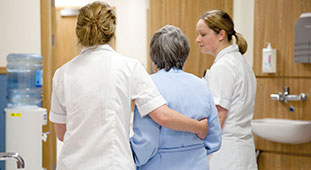Over 6000 Tayside individuals help determine the genetic basis of a person’s response to statins
Published On Tue 28 Oct 2014 by Roddy Isles

An analysis of over 40,000 people undergoing statin treatment has revealed two new genetic variants that may affect how low density lipoprotein (LDL) cholesterol responds to statin therapy.
The study, published in Nature Communications, provides further insights into the genetic basis of drug response.
Statins have been shown to lower LDL cholesterol levels by up to 55 per cent and are therefore highly effective in the management and prevention of cardiovascular disease. Despite this success, however, patient response can vary widely and this variation is known to have a genetic component.
Professor Colin Palmer and Professor Helen Colhoun, both from the University of Dundee Medical School, and colleagues from across Europe and the United States analysed data from 18 individual studies. One of these included 6000 statin-treated patients from Tayside.
The studies were established to look for genetic variants influencing patients’ response to statins and found two new genetic variants that significantly affected the degree to which LDL cholesterol was lowered during treatment.
Professor Palmer said, “One variant, located near the sortilin gene — a gene known to control cholesterol levels when not on statin drugs — was associated with a greater sensitivity to statins.
“In contrast, the second variant, known to have a role in the uptake of statins by the liver, decreased the effects of the drug. This may be due to patients who have this variant stopping taking their statins due to side effects such as muscle pain.
“This variant has previously been shown to affect how likely an individual is to suffer from statin induced muscle pain or damage. Our team in Tayside is currently leading a Europe-wide study to develop better genetic predictors to be able to prevent side effects of statins in patients.”
Professor Colhoun said the support of the public across Tayside was vital in helping scientists make significant breakthroughs such as this.
“This has been a major research project with input from across Europe and the United States and the patients from Tayside who took part in the study have helped give us the essential data that was needed to make these findings,” she said.
“It is important that people are aware of the impact they can have on this kind of research. We are hugely grateful to all of those who take part in these studies.”
Individuals who have suffered side effects of statin drugs or ACE inhibitors can still contribute to studies. Anyone who matches the criteria and wishes to contribute should contact the GoSHARE-ADR research team on 01382 383212 or by emailing m.z.white@dundee.ac.uk
Roddy Isles
Head of Press
TEL: 01382 384910
MOBILE: 07800 581902
E-MAIL: r.isles@dundee.ac.uk